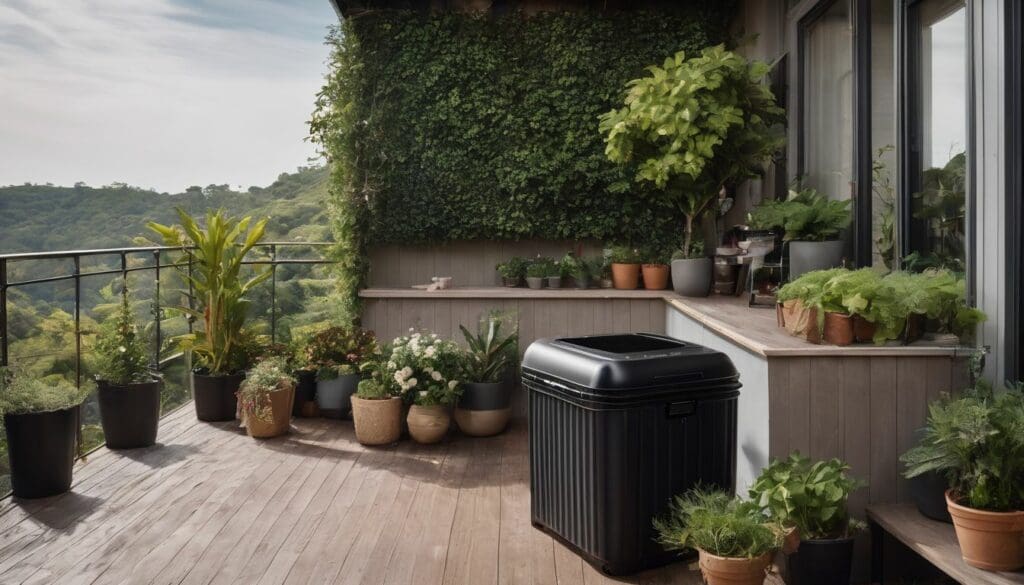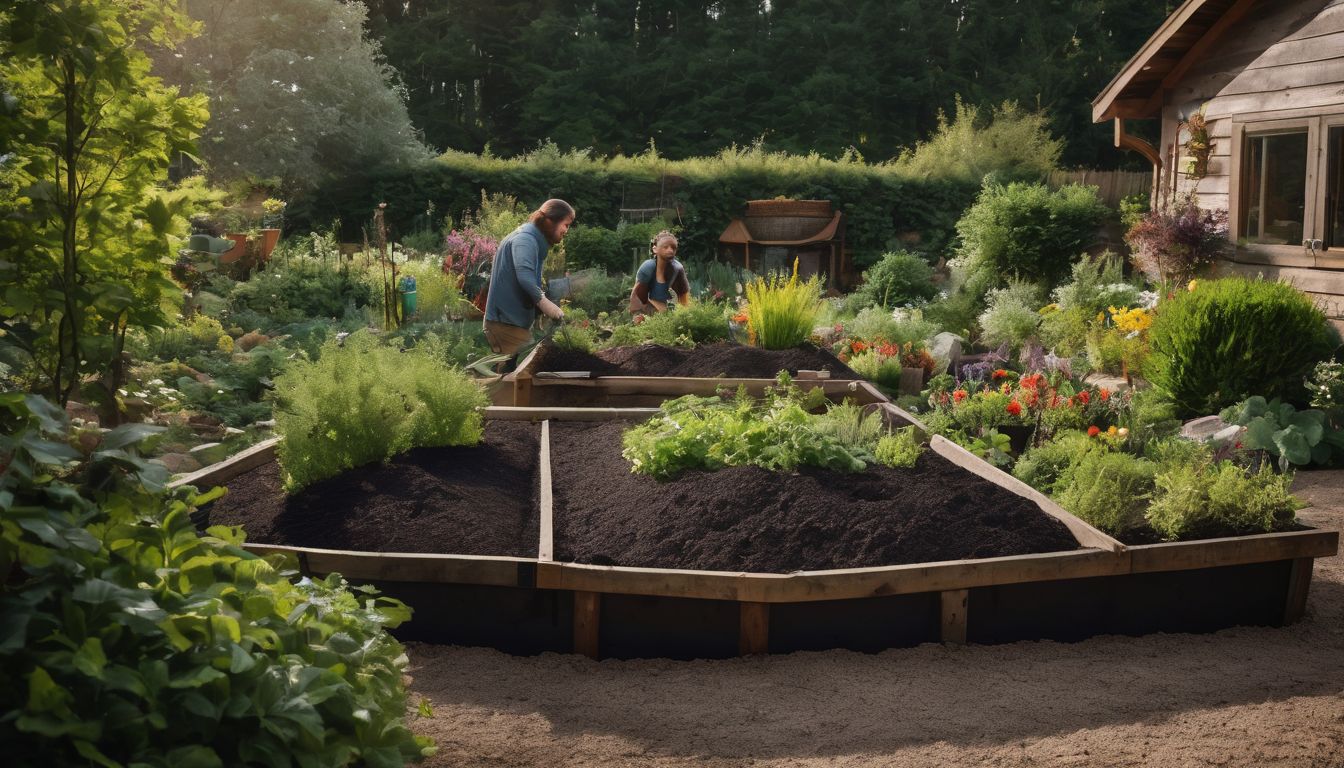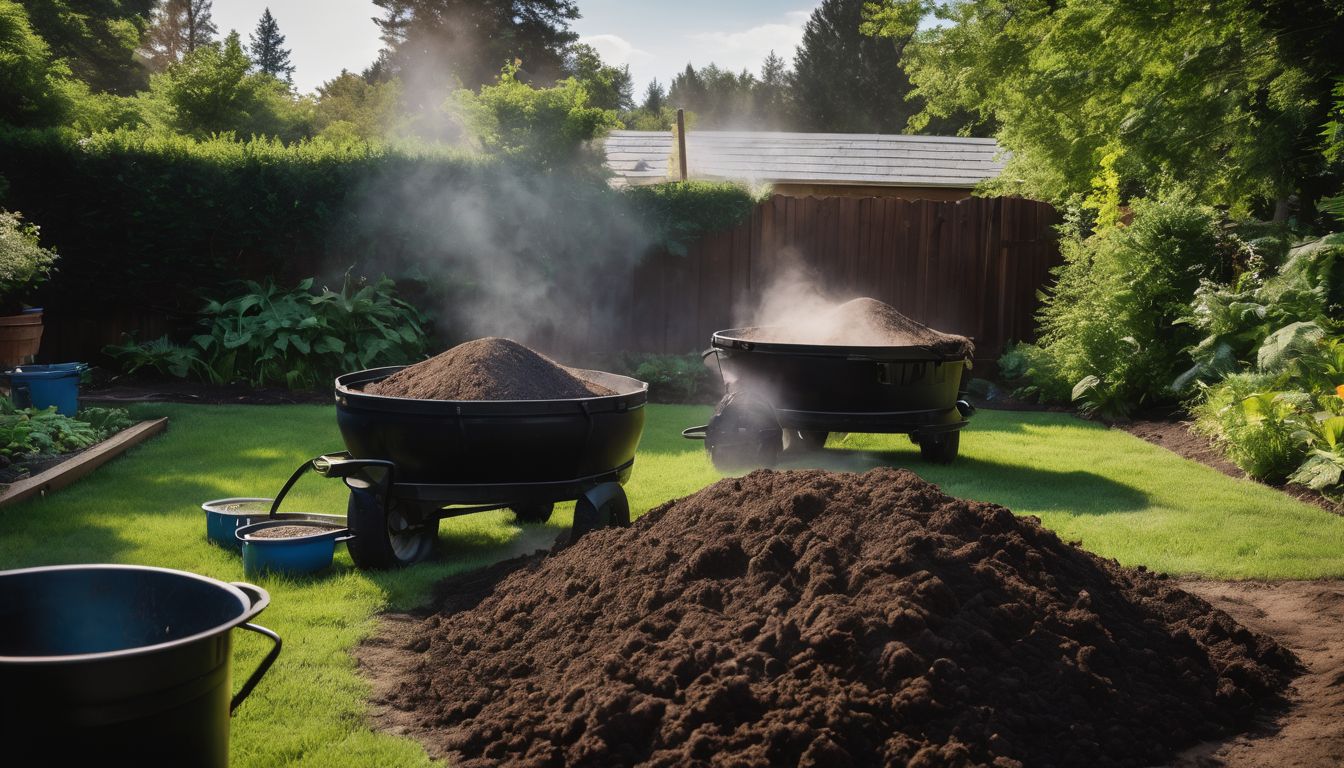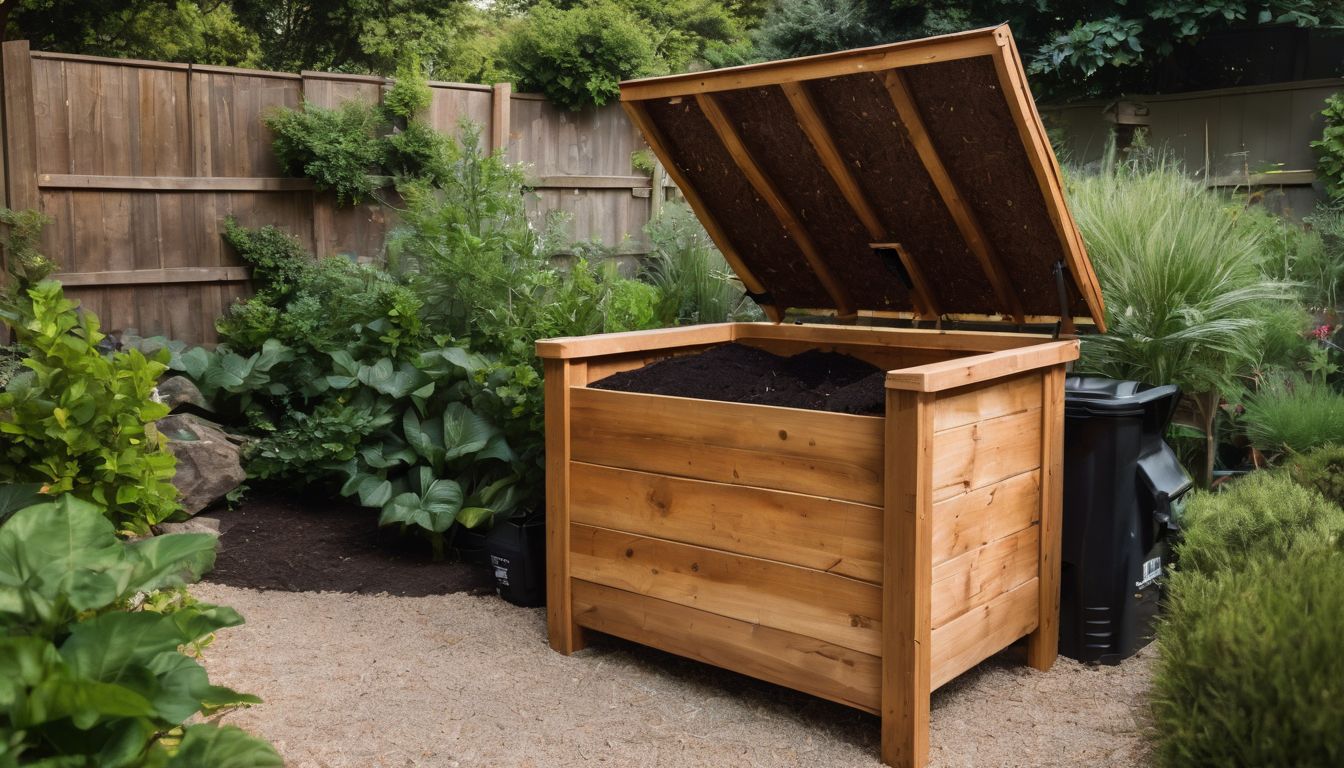Finding space for composting can be a real puzzle in small homes or flats. Yet, an astonishing amount of household waste could turn into garden gold instead of heading to the landfill.
In this post, we’ll uncover handy methods and clever hacks that make composting possible even in the tightest quarters. Discover how your kitchen scraps can flourish into nourishment for plants!
Key Takeaways
- Composting can substantially reduce landfill waste and methane emissions by turning organic kitchen scraps into nutrient-rich soil, even within the confines of small living spaces like apartments or flats.
- Small-scale composting options such as worm bins, bokashi systems, plastic storage bins and 5-gallon buckets are effective, require minimal space and can be easily managed indoors or on balconies.
- Through methods like vermicomposting and bokashi fermentation, residents with limited outdoor areas can participate in environmentally friendly practices while producing high-quality fertiliser for plants.
- Utilising compost pick – up services provides an alternative solution for those unable to maintain a home compost system, ensuring organic waste contributes to soil health rather than landfill volume.
- By selecting appropriate containers, balancing “green” and “brown” materials in your bin, and maintaining proper moisture levels, successful composting is achievable even with restricted space.
Reasons to Compost in Small Spaces
Composting in small spaces offers several benefits, including environmental advantages such as reducing methane emissions and conserving landfill space, saving on waste disposal costs, and providing an opportunity for those with limited outdoor areas to still engage in sustainable practices.
Environmental benefits
Composting in small spaces turns kitchen scraps and yard waste into nutrient-rich soil. This process cuts down on the amount of organic waste sent to landfills, which is crucial because landfill waste produces methane—a powerful greenhouse gas.
By converting leftovers and garden trimmings into compost, you directly reduce your carbon footprint.
Using compost enriches the soil, promotes healthier plant growth, and helps retain moisture. It acts as a natural fertiliser without needing chemical alternatives, thereby safeguarding local waterways from harmful runoff.
Your eco-friendly efforts support biodiversity by creating a more balanced ecosystem right at home. Plus, plants grown in compost-amended soil can absorb carbon dioxide better, contributing further to environmental conservation.
Cost-saving benefits
Composting in small spaces offers significant cost-saving benefits, particularly for environmentally conscious individuals looking to reduce their waste and create nutrient-rich soil.
By composting kitchen scraps and organic materials, you can save money on purchasing commercial fertilisers and reduce the amount of waste sent to landfills. This sustainable practice not only helps cut down on household expenses but also contributes to a greener lifestyle by minimising the need for costly gardening products.
Furthermore, small-scale composting allows flat dwellers and urban residents to repurpose food waste into valuable compost without investing in expensive outdoor equipment or services.
Useful for those with limited outdoor space
Ideal for individuals with limited outdoor space, composting in small areas offers an eco-friendly solution for managing food waste. Small-scale composting methods such as worm bins, plastic storage bins, and 5-gallon buckets enable apartment dwellers or urban residents to recycle kitchen scraps effectively.
Those with balcony gardens or small container gardens can utilise their limited space to contribute to sustainable living by embracing worm composting or bokashi composting techniques.
With the rise of apartment living and urban gardening, these compact composting options cater to the environmentally conscious who seek practical ways to reduce food waste and support eco-friendly initiatives within confined spaces.
Options for Composting in Small Spaces
Looking for options to compost in your small living space? There are several choices, such as worm bins, plastic storage bins, 5-gallon buckets, and even boxes that you can use to start composting at home.
Each option has its own benefits and can fit into any small space.
Worm bins
Worm bins are an ideal option for composting in small spaces, such as flats or urban settings. They utilise red worms to break down organic waste materials into nutrient-rich compost.
The process is efficient and odourless, making it perfect for indoor use. By placing a worm bin in your kitchen or balcony, you can easily recycle food scraps and contribute to eco-friendly living.
Vermicomposting also provides a valuable learning opportunity for those interested in waste management and small-scale gardening.
To set up a worm bin, find a suitable container and bedding material before adding the worms and food scraps. Regularly feeding the worms with appropriate kitchen waste will result in high-quality compost over time.
Plastic storage bins
Plastic storage bins provide a convenient and affordable option for composting in small spaces. These bins are versatile and can be used both indoors and outdoors, making them suitable for apartment dwellers or those with limited outdoor space.
With proper ventilation and drainage, plastic storage bins effectively break down food scraps and yard waste into nutrient-rich compost. They are easy to maintain, requiring minimal effort to turn the compost and monitor moisture levels.
Plastic storage bins offer a practical solution for environmentally conscious individuals interested in reducing their carbon footprint by recycling kitchen waste. By repurposing plastic storage bins as composting containers, small-scale urban gardeners can contribute to the eco-friendly practice of turning organic waste into valuable soil amendments for balcony gardening or small space landscaping projects while actively supporting conservation efforts through food waste recycling.
5-gallon buckets
5-gallon buckets are an excellent option for composting in small spaces. They are affordable, readily available, and easy to manage. To start, drill holes in the bottom of the bucket for drainage and on the sides for aeration.
Layer green and brown materials such as kitchen scraps, coffee grounds, shredded paper, and garden waste inside the bucket. Remember to keep it moist but not soggy, and turn the contents regularly to speed up decomposition.
Utilise this simple method to create nutrient-rich compost right at home.
Boxes
When considering composting in small spaces, 5-gallon buckets are not the only option. Boxes can also be repurposed for composting, making them a versatile and accessible choice for urban dwellers or those with limited outdoor space.
Cardboard boxes, plastic crates, or wooden containers can all work well as makeshift compost bins. They provide an affordable and sustainable solution to manage kitchen waste while contributing to eco-friendly living practices.
To utilise boxes for composting effectively, ensure they have good airflow by poking holes around the sides and bottom of the container. Layer kitchen scraps with brown material such as shredded paper or dry leaves to maintain balance and generate nutrient-rich soil amendment.
Using Bokashi for Indoor Composting
Bokashi is a fermentation process that breaks down food waste using beneficial microorganisms, making it a great option for indoor composting. It’s quick, odourless and produces a nutrient-rich liquid that can be used as plant fertiliser.
Definition and process of bokashi
Bokashi is a method of composting that involves fermenting kitchen waste using a mix of beneficial microorganisms. To start the process, layer your food scraps in a bokashi bucket with a sprinkling of bokashi bran in between each layer.
Tamp down the waste to remove any air pockets and then seal the lid tightly to create an anaerobic environment. Over the next few weeks, be sure to drain any excess liquid from the bucket regularly – this liquid can be used as an effective organic fertiliser for your garden.
Once fermentation is complete, you can bury the pre-composted waste directly into your soil or add it to an outdoor compost pile.
Benefits of using bokashi
Bokashi composting is an ideal option for those with limited space, such as apartment dwellers or urban residents. It’s a quick and efficient way to turn food waste into rich, nutrient-dense soil without the need for outdoor bins or piles.
Additionally, bokashi composting helps reduce greenhouse gas emissions by preventing organic waste from ending up in landfills, contributing to a healthier environment and promoting eco-friendly living.
Using bokashi in small spaces allows individuals to actively participate in reducing their carbon footprint while creating valuable compost that can be used for small-scale gardening projects.
This method offers an innovative solution for environmentally conscious individuals seeking sustainable alternatives to traditional composting practices, supporting conservation efforts and green living initiatives through practical actions.
Utilising Compost Pick Up Services
Compost pick-up services offer a convenient solution for those with limited space to compost at home. By using this service, you can reduce waste and contribute to a more sustainable environment without the need for outdoor composting.
How it works
Utilising a compost pick-up service is a simple process. You sign up for the service, receive a collection container, and put your food scraps and other compostable materials inside.
Once the container is full, you place it outside on the designated day for pick-up. The company then collects the container and transports it to a composting facility where it can be properly processed.
If you are unable to find a compost pick-up service in your area, consider reaching out to local waste management or environmental organisations that might offer drop-off centres. Some cities provide communal locations where residents can bring their organic waste for proper disposal.
Benefits of using a pick-up service
Using a compost pick-up service offers convenience and helps you manage your compost in small spaces. This service allows you to have your compost collected regularly, saving you time and effort.
By utilising this pick-up service, you can contribute to environmental conservation by diverting organic waste from landfills, reducing greenhouse gas emissions, and promoting sustainable living.
Additionally, using a pick-up service ensures that your organic waste is being properly processed into nutrient-rich compost instead of adding to the burden on landfill sites. It also makes it easier for individuals with limited outdoor space or those who may not be able to manage their own compost efficiently.
Finding a composting centre
Look for community composting centres near you. Check local government websites or contact your waste management department to find out about drop-off locations. Utilise online resources like Eco-Cycle’s website, which provides a directory of drop-off sites and compost collection services in various areas.
Take advantage of apps like ShareWaste that connect people who want to compost with neighbours willing to share their compost bins.
Consider joining community gardens or urban farming initiatives that often have designated areas for communal composting. Engage with local environmental groups or eco-conscious communities on social media platforms; they can provide valuable information regarding nearby composting options.
Tips for Successful Composting in Small Spaces
– Choose a convenient location for your compost bin, such as a balcony or small outdoor space.
– Add a mixture of “green” and “brown” materials to your compost, including kitchen scraps and dry leaves, to maintain the right balance.
Where to place your compost bin
Consider placing your compost bin in a convenient spot near your kitchen or garden to encourage regular use. A well-ventilated, shady area with good drainage is ideal for outdoor bins.
Indoors, select a location with moderate temperature and moisture levels to support the decomposition process. This might be under the sink or on a balcony if you live in an apartment.
By situating your compost bin thoughtfully, you can ensure that it’s easily accessible for adding scraps while also creating an environment conducive to efficient decomposition.
What to put in your compost bin
Position your compost bin in a suitable location before adding waste material to it.
Start by mixing green and brown materials, such as fruit and vegetable scraps, eggshells, coffee grounds, and garden waste like leaves and grass cuttings. Alternate layers of kitchen waste with garden debris for better aeration.
Aim to maintain the right balance between wet and dry materials inside your compost bin – this will encourage decomposition while minimising odours. Avoid including meat or dairy products as they can attract pests; instead opt for plant-based food waste.
Tips for success
Position your compost bin in a convenient, well-drained area. Ensure it receives adequate sunlight and airflow to aid decomposition. Mix green and brown materials regularly to maintain a balanced carbon-nitrogen ratio, promoting efficient breakdown.
Cover the compost to retain moisture and heat, assisting the decomposition process. Avoid adding meat, dairy, or oily foods as these can attract pests and cause odours.
Monitor your compost’s moisture level; it should resemble a wrung-out sponge—damp but not soggy. Chop large food scraps into smaller pieces to accelerate decomposition and deter pests.
Consider using a kitchen composter for ease of use and quicker break down of organic waste.
Rotate or aerate the compost pile frequently using a pitchfork or shovel to introduce oxygen for aerobic bacteria that facilitate quick decomposition. Add shredded newspaper or cardboard for more carbon if needed while ensuring it doesn’t become too dry.
Conclusion
In conclusion, composting in small spaces is achievable and beneficial. You can reduce waste, create rich soil, and support the environment even in limited outdoor areas or indoors.
By implementing the tips and tricks mentioned above, you can successfully compost in small spaces while contributing to a more sustainable lifestyle. With the right knowledge and tools, anyone can embrace eco-friendly living through small-scale composting initiatives.
FAQs
1. Can I compost if I only have a small space?
Yes, you can practice small-scale composting even with limited space by using methods like kitchen composting or finding a local compost drop-off centre.
2. What are the best tips for composting in tiny areas?
To successfully compost in tiny areas, start with a small container for kitchen scraps and consider vermicomposting or bokashi to manage waste without needing much room.
3. How does kitchen composting work when living eco-friendly in an apartment?
Kitchen composting is ideal for eco-friendly living in apartments; you store food waste in special bins and either process it at home with worms or take it to a nearby drop-off point.
4. Is there any way to use my homemade compost if I don’t have a garden?
Sure! You can use your homemade compost to enrich potted plants indoors, join community gardening projects, or share it with friends who enjoy small space gardening.





